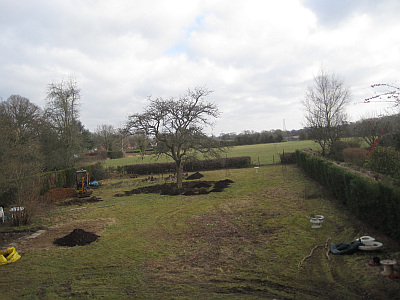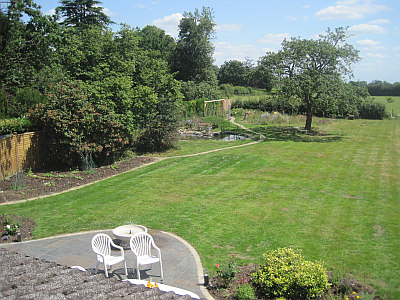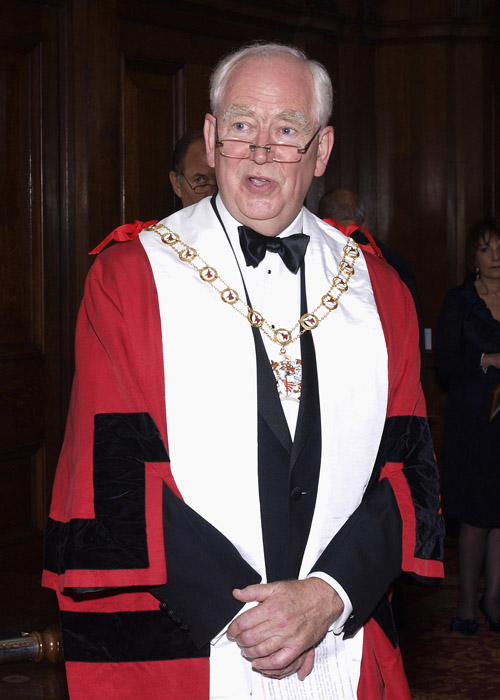....just when you thought it was safe to put fish back in the water! (Episode 2: follows Pond Wars....)
Previously …….. on “Homegarden”:
- “Careful you don’t tip the digger into that hoooooooooooooole!”
- “No, that can’t be a live electric wirezzzzzzzzzt!”
- “I’m sure that these wellies are long enougluggg!
Now read on:....
Having dug the carp-pond, lined it, stocked it with weed and things of that kind, the moment arrived when some fish were the only missing feature and

Garden View - BEFORE....
we (the under-gardener and the Chatelaine) duly went off to Malvern where, in addition to lots of Delius tribute bands operating out of modest shop-fronts, you can find some of the finest carp suppliers in the country.
We loaded up the car with a mobile aquarium, made of a metals recycling box supplied thoughtfully by Dacorum Borough Council, and set off with high hopes and low initial stress levels. The latter were soon elevated when it became apparent that traveling with 40 litres of pond water in an open-topped container in the boot of the car was not such a great idea.
A mini-tsunami occasioned by the first sudden stop as we tried to join the fast-moving flow of the A41 from the minor tributary of the Berkhamsted village road persuaded us that, desirable as it was to take some water with us so that the fish should have time to get used to their new home in transit, there were certain drawbacks to this approach. After we’d dried off and started afresh, the journey went well, aside from the mounting dread as to how we were going to protect the new carp from the predatory attentions of the local heron.
One of the - well, no, actually the only appealing - feature of the heron is that the word is the same whether you are talking single heron or a flock of heron. This linguistic feature may be a result of previous generations of humans losing the will to discriminate between them, since there is no such thing as good or well-behaved heron and therefore individuation is fruitless.
Heron are in fact the projection into our part of the space-time continuum of a personification – or ornithonification – of malign influences which date back to the Big Bang. Heron have survived unchanged for millennia because they evidently represent both the will to live and the will to irritate rolled into a uniquely potent manifestation of mischief.
The expression “waking at sparrow-f …… breaking of wind” which has occasionally crossed the minds of management consultants as they prepare for another day in Scunthorpe trying to persuade a client that a change programme is really all that stands between them and the bright sunny uplands of commercial success, does not really do justice to the heron – this utterly ungainly bird always manages to beat the sparrow to it!
It cannot be said that both are competing for the same food because the early sparrow may catch the worm but the heron is after altogether more substantial food – to whit, my carp! So the survival imperative for the heron is not to beat the sparrow but to beat the owner of the aforesaid carp-pond and, in particular, his ability to reach the air-rifle before the bird has reached the fish!
As I was saying, however, the trip to Malvern, after a somewhat damp start, went well enough and about ten (I say “about” because it’s not easy to count moving identical fish when they are swimming around in a state of some agitation in a 40-litre tank) carp were duly installed (ie poured) into the wide-open submarine spaces of the 20,000-litre fish pond.
I’m not sure whether fish generally suffer from agoraphobia but it was clear that the Malvern fish were not well attuned to anything other than Malvern water because they congregated in the shallow end of the pond and huddled together for warmth, or company, or something … or all three.
This was not in itself a problem because, as a responsible fish-owner, I would not wish to distress them with any forced dispersal programme aimed at “settling” the pond in an orderly fashion as was not done in the Wild West. My problem however, arose in the anticipation that, huddled as they were in the shallow end of the pond, they were, for want of a better expression, like fish in a barrel (a 20,000-litre barrel of course) and absolutely at the mercy of the heron.
In these early days after the pond was stocked with carp, the early morning “Wacht am Bulbourne” (the little stream that bubbles through Berkhamsted) was successful in fending off the attentions of the heron, but the day came when the arms race had reached a point where the means of attack were stronger than the means of defence – or rather, I overslept that morning and the winged menace got away with several bellyfuls!
Ornithologists should read no further from this point...!
Frustrated to the very core at the success of this feathered fiend, this beaked beast, this winged waster, this alliterative avian (OK, I got carried away), I swore that he (or maybe she since I have no idea about the distinctive gender features of the damned things – see above) was not going to get another one of my fish!
A pre-emptive Schlieffen Plan swung into action with the invasion of the nearby trees to create a network of wires that would stop the heron landing. This was well enough on paper but ran into certain practical problems when it was recognised that this network was neither strong enough to sustain washing nor well placed to allow the Chatelaine to access the real washing line. Such are the frustrations of balancing competing priorities in this increasingly complex world.
The wire trick having been consigned to the dustbin of history, the next step was to do some ornithological research which revealed that the heron like to reconnoitre their fishing grounds with a quick overflight before swooping in for the kill and I therefore stretched a cardboard cut-out of a shark over the top of the pond.
The first effort here failed, since a 3-foot long shark was clearly of no use, so I concluded that “we gonna need a bigger shark”!
This ultimate 18 foot by 4 foot creation was admittedly rather prominent in the view from the dining room….. and the main bedroom …. and, indeed, from every room on the garden side of the house but it was surely going to do the job because the whole appeal of being a heron (viewed from their perspective, of course) is that you have a better chance of eating the fish than of being eaten by the fish.
The unforeseen effect of this approach however, lay in the fact that the large (ish) shark cast an equally large shadow over the pond that slowed down (well, actually stopped) the growth of the desirable aquatic flora. After some recrimination, it was agreed (if that term can be applied to a capitulation in the face of the Lysistrata sanction) that the shark be removed.
My next resort was to consider a mild electric charge (not more than 10,000 volts) but was advised that there might be drawbacks here too, given the presence of water in the immediate vicinity

Heron's view of the Garden.......AFTER
Just as a cut-out hawk will keep away small birds, I thought that a cut-out dog and cat would do the trick provided that it was mobile – this posing a certain problem with the means of achieving mobility.
All of these methods were to no avail since the bird came to like settling on the back of the cardboard dog to save itself from getting wet feet while it was fishing. By this point in the saga I was seeking solace in the occasional gin and tonic as a means of settling my nerves – sometimes as early as 0800, before the sun had even started to speculate about the possibility of crossing the yard-arm!
None of the physical means having delivered the goods (or its head on a plate) I resorted to ornitho-psychology – a rather esoteric field but with the limitless intellectual curiosity that characterises management consultants, I boned up on the subject and found in the estimable work of Professor Ernst von Fischer (no relation) and his son Wolfgang (and their company, Herrn Von Fischer) an approach which ultimately worked.
It has been observed that heron never land immediately alongside the pond in which they propose to fish but rather land about 10 feet away and then walk across to the edge of the pond.
This was my chance, since it was clear that I had only to put some pieces of lemon on the margin of the pond to convince the heron that the fish would have too many hard bones and would therefore be a bad idea – I was astonished that this rather elliptical approach appeared to work and while I admit that this does limit the appeal of the pond to human eyes, the fish are happy – insofar as you can attribute such feelings to fish on which I have no opinion.
So, to cut a long and perhaps implausible story short, I’ve cut out the cut-outs and stuck to the lemon’s aid.

PM Geoff Llewellyn